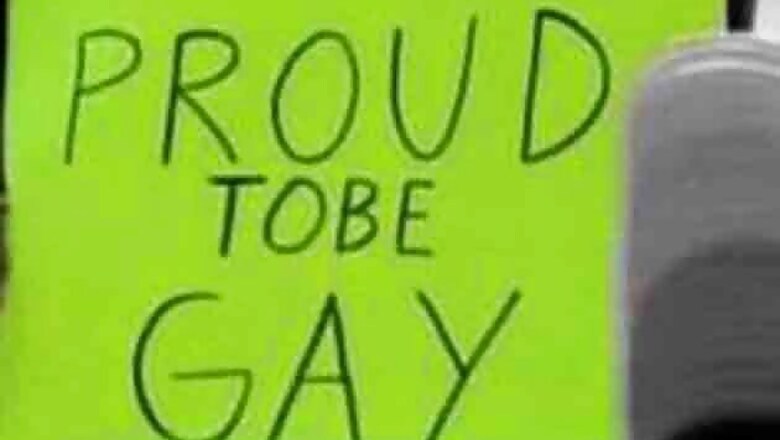
views
Bangkok: China's government considered homosexuality a mental disorder until 2001. In Egypt's conservative, Muslim-dominated society, laws prohibiting "shameless public acts" have been used to imprison gay men in recent years. Even some gay rights activists in the Philippines are opposed to same-sex marriage.
And in Malaysia, the government has twice prosecuted a prominent opposition leader on charges of sodomy, which is punishable by 20 years in prison.
While gay-rights activists around the world hailed President Barack Obama's support for same-sex marriage as a symbolic victory, for many the idea of legal unions between homosexuals is a distant dream. Gay people in many countries would settle for simply getting to be themselves without fear of being attacked or thrown in prison.
In China, "the government treats homosexuality like it does not exist," said Xiong Jing, an activist who volunteers in gay support groups in Beijing. She said Thursday that legalizing gay marriage there would be "unrealistic and impossible."
China's authoritarian government shows little tolerance for activism of any kind, and sodomy was a crime until 1997. Even today gays are frequently discriminated against and ostracized. While Xiong welcomed Obama's support for gay marriage, seh didn't think it would make much difference.
"If he, as president, was able to not just express his own personal opinion but to support policies on this, that would be even better," she said.
America's role as a global agent of change is exactly what worries Ibrahim Ali, an independent member of Malaysia's Parliament and leader of a rights group for the country's majority Malay Muslims.
"We want good relations with America, but America must not interfere in other countries' policies on this issue," he said.
"They can practice this in America if they want, since it's their right, but we are still very concerned, because whatever America practices, it often wants other countries to follow suit."
While Malaysia rarely enforces its sodomy law, it was used twice against Anwar Ibrahim, a leader of the opposition party who went to prison after a conviction in 2000 and was acquitted in a separate case early this year. Anwar denies being gay and says the charges were a trumped-up effort to remove him from politics.
But gays who speak out commonly become targets of abuse, such as Azwan Ismail, who drew anonymous death threats and criticism from Islamic officials when he spoke about his sexuality in a YouTube video in 2010.
Azwan said he was heartened by Obama's comments, and that Malaysians who support gay rights should "take this as a sign to be active and brave. ... This is crucial in fighting homophobia in this country."
Homosexuality also remains taboo in India, despite large gay pride parades recently in New Delhi and other big cities. Only this year, the government accepted a court ruling that struck down a colonial-era law banning gay sex, and the Supreme Court is now hearing appeals.
In the overwhelmingly Catholic Philippines, the only country in the world apart from the Vatican where divorce is illegal, the issue of gay marriage is not even on the agenda of gay rights groups because some of their members oppose it.
"We have some members who are religious, and their belief and devotion to God is there and is the biggest hindrance for them," said Goya Candelaria, spokesman of Pro Gay association.
Religious mores tend to be the most-frequently invoked objection by opponents of gay marriage around the world, especially in countries with strong Catholic and Muslim traditions.
"This is unacceptable, because it is against religion, traditions and against God," said Shady Azer, an engineer in Cairo. "God created Adam and Eve. He didn't create two Adams or two Eves."
The Vatican, a strident opponent of gay marriage, did not immediately comment on Obama's announcement, but politicians tied to Pentecostal and Catholic churches in Latin America spoke out strongly against it.
"Barack Obama is an ethical man and a philosophically confused man," said Peruvian congresswoman Martha Chavez, a member of the conservative Catholic Opus Dei movement. "He knows that marriage isn't an issue only of traditions or of religious beliefs. Marriage is a natural institution that supports the union of two people of different sexes because it has a procreative function."
There are other places where Obama's endorsement of gay marriage was a ho-hum affair. Many European countries, as well as Canada, Argentina and South Africa, already allow gay marriage. So do six US states and the District of Columbia.
"It seems to me that by taking this position Obama is aligning himself with the entire world, with these times we're living in, with the achievements of rights in other countries," said gay-rights activist Cesar Cigliutti in Argentina, which in 2010 became the first Latin American country to allow gay marriages.
New Zealand's Prime Minister, John Key, broke his long silence on gay marriage and said his government may consider allowing it "at some stage."
But in Australia, where polls show that most people support gay marriage, the left-leaning Prime Minister Julia Gillard said on Thursday that she remains opposed, and three bills in Parliament that would allow same-sex couples to marry are unlikely to be passed.
France also has a population largely in support of gay marriage and a head of state who opposes it, but that is about to change. Francois Hollande, who defeated President Nicolas Sarkozy in elections Sunday, made "the right to marry and adopt for all couples" part of his campaign platform, and has set legislative passage for no later than June of next year.
In Thailand, gay activist Natee Teerarojjanapongs was energized by Obama's statement. Though Thailand is often seen as gay-friendly by tourists, Thai society remains deeply conservative and there is little support for expanding gay rights.
"I was starting to lose hope in fighting for gay marriage legalization in Thailand," Natee said, "but now Barack Obama's endorsement is rekindling my fire and is giving me the encouragement to go on."




















Comments
0 comment